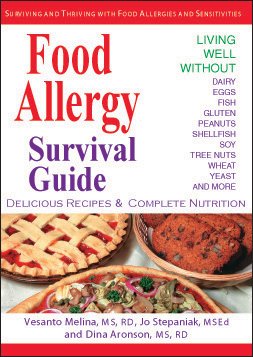Food Allergies Last Longer Than They Used To:
Food Allergy Facts You Need to Know
by www.SixWise.com
A new study has disproved the conventional belief that food
allergies in children are outgrown
at an early age. Instead, a study in the Journal of Allergy
and Clinical Immunology found that only 19 percent of the
over 800 children in their study outgrew their allergy to
milk by the age of 4.
|

Only 19 percent of kids with a milk allergy will outgrow
it by the age of 4.
|
Another 42 percent outgrew the allergy by age 8, and 64 percent
by age 12. In all, only 79 percent of the group outgrew their
allergy by age 16.
This left one in five of the group with a milk allergy well
into their teen years. Allergic children who also had asthma
and allergic rhinitis had a lower chance of outgrowing the
allergy than other children.
The study has far-reaching implications for children with
food allergies, particularly those to milk. "The prognosis
for developing tolerance [to milk] is worse than previously
estimated," the researchers said, while calling for increased
safeguards for children with milk allergy (along the lines
of those given to kids with peanut allergies).
What Causes Food Allergies, and How Widespread Are They?
A food allergy occurs because your immune system mistakenly
recognizes a certain food as dangerous, and then produces
a response against it. Symptoms can range from the more mild
skin rash, vomiting and diarrhea to the very serious anaphylaxis,
which constricts the airways and requires immediate medical
attention.
Though most food allergies begin in childhood, before the
age of 2, they can occur at any age and involve just about
any food. That said, there are eight
foods that cause 90 percent of food allergies, and these
are:
-
Peanuts
-
Eggs
-
Milk
-
Shellfish
-
Wheat
-
Tree nuts (walnuts, pecans, etc.)
-
Soy
-
Fish
According to the Centers for Disease Control and Prevention,
about 2 percent of adults in the United States, and 4-8 percent
of children, suffer from food allergies. Among them, 150 die
from the allergies each year.
The most common food allergies in kids are wheat, cow's milk
and soy. Allergies to tree nuts, fish and seafood can also
occur, but are less common (and more likely to last into adulthood).
|
Got Food Allergies? Get The Food
Allergy Survival Guide Book!
 For
a complete guide on how to eat if you have food allergies
and intolerances, check out the highly recommended Food
Allergy Survival Guide Book. In it you'll learn: For
a complete guide on how to eat if you have food allergies
and intolerances, check out the highly recommended Food
Allergy Survival Guide Book. In it you'll learn:
-
How to avoid the foods and ingredients that trigger
reactions
-
How to substitute healthful ingredients for those
that trigger allergic responses
-
How to meet recommended nutrient intakes while
avoiding trigger foods such as dairy products, eggs,
gluten-containing grains such as wheat, or other
food culprits
-
How to determine which food(s) may be triggers
for your symptoms ... and much more!
Find
out More About The Food Allergy Survival Guide Book
Now!
|
Can Food Allergies in Children be Prevented?
While no one knows exactly why certain children develop allergies,
it is known that if you have a food allergy, your child is
more likely to as well. Meanwhile, children with asthma are
at an increased risk of developing food allergies.
|

When you begin to introduce solid foods to your toddler,
do so one at a time. This way you'll know which foods
are tolerated and which aren't.
|
It used to be thought that exposing children to certain foods
at too young of an age would increase their risk of an allergic
reaction. In reality, recent research suggests that exposing
infants to food allergens early in life may actually boost
tolerance later in life. So the nutritional dogma to wait
to expose your children to certain foods is currently being
debated.
While the final results remain to be seen, you can decrease
your child's likelihood of developing food allergies by breastfeeding
exclusively for at least six months, and continuing up to
a year or more (along with supplemental foods).
When you do begin to introduce solid foods, do so one at
a time, avoiding mixed foods, so that you can be sure which
foods are tolerated.
Some common symptoms of food allergies in children are rashes,
vomiting, diarrhea, colic, and constipation. If you notice
these symptoms in your child, try removing the suspect food
from his or her diet and watching to see if the symptoms resolve.
If you're an adult with food allergies, the following tips
can help:
-
Strictly avoid the food you are allergic to, including
any related products.
-
Diligently read food labels (hidden ingredients, particularly
with wheat and peanuts, can be anywhere, but the Food
and Drug Administration requires that at least the top
eight allergens must be clearly stated on food labels).
-
Let the server in a restaurant know you absolutely cannot
have certain ingredients.
-
For those with severe food allergies, always carry a
self-injectable epinephrine (often called an Epipen) in
case of emergency.
Also, be sure to check out The
Food Allergy Survival Guide Book, our top-recommended
source for anyone with food allergies.
You'll learn what your food triggers might be, how to avoid
them, easy-to-use, healthy alternatives, and even great-tasting
allergen-free recipes (like Ultra Fudge Brownies, Divine Macaroons,
Banana Bread and many more!).
Recommended Reading
Does
Early Exposure to Food Allergens Increase Tolerance to Them?
50%
of U.S. Population Has Allergies, Most Don't Realize It &
Suffer Unnecessarily ... Do You?
Sources
The
Journal of Allergy and Clinical Immunology November 2007,
Volume 120, Issue 5, Pages 1172-1177
CNN.com
November 12, 2007